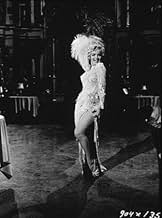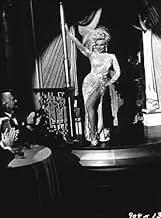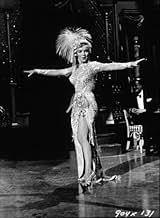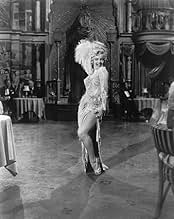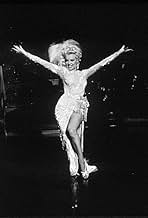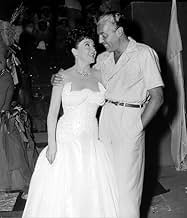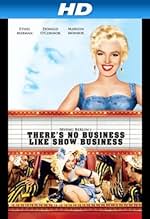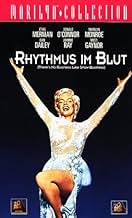IMDb-BEWERTUNG
6,4/10
7078
IHRE BEWERTUNG
Füge eine Handlung in deiner Sprache hinzuMolly and Terry Donahue, plus their three children, are The Five Donahues. Son Tim meets hat-check girl Vicky and the family act begins to fall apart.Molly and Terry Donahue, plus their three children, are The Five Donahues. Son Tim meets hat-check girl Vicky and the family act begins to fall apart.Molly and Terry Donahue, plus their three children, are The Five Donahues. Son Tim meets hat-check girl Vicky and the family act begins to fall apart.
- Regie
- Drehbuch
- Hauptbesetzung
- Für 3 Oscars nominiert
- 4 Nominierungen insgesamt
Dorothy Abbott
- Showgirl
- (Nicht genannt)
Dorothy Adams
- Nurse
- (Nicht genannt)
Robert Adler
- Night Watchman
- (Nicht genannt)
Aladdin
- Orchestra Violinist
- (Nicht genannt)
Fred Aldrich
- Private Detective
- (Nicht genannt)
Empfohlene Bewertungen
There's No Business Like Show Business has the distinction of being the last of the Irving Berlin songbook musicals filmed. It came out the same year as White Christmas, also of the same genre.
Take a listen to the background music of films like Holiday Inn, Blue Skies, Alexander's Ragtime Band, and this one. I defy you to find one non-Berlin note in the film and that's no accident. The more songs of Irving Berlin used, the more money he made. He was one shrewd businessman Irving, most of the time.
The title song is identified with Ethel Merman and it was introduced in Annie Get Your Gun. Merman like Mary Martin had a conspicuous lack of success in Hollywood as much as she was an icon on Broadway. She only did the screen version of two of her Broadway hits, Anything Goes and Call Me Madam. That's two more than Mary Martin did.
Anyway, I think the genesis of There's No Business Like Show Business probably came about when Call Me Madam became such a hit and the movie money people saw how the chemistry was between her and Donald O'Connor. So O'Connor was signed to play one of her three children. The other two children were Johnnie Ray and Mitzi Gaynor.
The plot such as it is, is the story of the Donahue family between both World Wars. The father of the aforementioned children is Dan Dailey and he and Merman do some good Irving Berlin numbers together. I've always marvelled at how graceful Dan Dailey moved on the screen in his musical films. He was not a creative sort in the same way Fred Astaire or Gene Kelly were. Probably if he had been, his reputation would be higher today. But he was a pleasing entertainer every time you saw him.
By all accounts it wasn't a happy film for Ethel. Marilyn Monroe is in the film and Ethel was jealous of her. Not that Monroe wasn't her usual difficult self. Probably that helped the plot because it does call for the two to be at odds. Merman believes that Monroe has led Donald O'Connor astray.
Mitzi Gaynor was a wonderful talent as well. Too bad she wasn't born twenty years earlier, what a big star she would have been in the thirties and forties in Hollywood musicals then. Good singer and one fabulous dancer.
The plot does get kind of sticky in spots and Johnnie Ray didn't set the screen on fire when he wasn't singing. No accident he didn't become a film star.
Still for those of us who bless the day Irving Berlin put down his first notes of an original song, it's worth watching.
Take a listen to the background music of films like Holiday Inn, Blue Skies, Alexander's Ragtime Band, and this one. I defy you to find one non-Berlin note in the film and that's no accident. The more songs of Irving Berlin used, the more money he made. He was one shrewd businessman Irving, most of the time.
The title song is identified with Ethel Merman and it was introduced in Annie Get Your Gun. Merman like Mary Martin had a conspicuous lack of success in Hollywood as much as she was an icon on Broadway. She only did the screen version of two of her Broadway hits, Anything Goes and Call Me Madam. That's two more than Mary Martin did.
Anyway, I think the genesis of There's No Business Like Show Business probably came about when Call Me Madam became such a hit and the movie money people saw how the chemistry was between her and Donald O'Connor. So O'Connor was signed to play one of her three children. The other two children were Johnnie Ray and Mitzi Gaynor.
The plot such as it is, is the story of the Donahue family between both World Wars. The father of the aforementioned children is Dan Dailey and he and Merman do some good Irving Berlin numbers together. I've always marvelled at how graceful Dan Dailey moved on the screen in his musical films. He was not a creative sort in the same way Fred Astaire or Gene Kelly were. Probably if he had been, his reputation would be higher today. But he was a pleasing entertainer every time you saw him.
By all accounts it wasn't a happy film for Ethel. Marilyn Monroe is in the film and Ethel was jealous of her. Not that Monroe wasn't her usual difficult self. Probably that helped the plot because it does call for the two to be at odds. Merman believes that Monroe has led Donald O'Connor astray.
Mitzi Gaynor was a wonderful talent as well. Too bad she wasn't born twenty years earlier, what a big star she would have been in the thirties and forties in Hollywood musicals then. Good singer and one fabulous dancer.
The plot does get kind of sticky in spots and Johnnie Ray didn't set the screen on fire when he wasn't singing. No accident he didn't become a film star.
Still for those of us who bless the day Irving Berlin put down his first notes of an original song, it's worth watching.
There are two main types of musicals--those where the emphasis is clearly on the music and others where the music is incidental to the story. While which style you like is up to you, for me, I much prefer those with less music--where the story is predominant. So, because of my personal preference, movies like "There's No Business Like Show Business" are NOT exactly my cup of tea, so to speak.
The film is about a fictional show business family, the Donohues. When the film begins, the three children are young. But then through the miracle of movie magic, soon about 15-20 years pass--and the children are now grown (and include Donald O'Connor and Mitzi Gaynor). Oddly, the parents, Dan Dailey and Ethel Merman, didn't seem to age a day. Even more noticeable is Marilyn Monroe--you see her early in the film and after all those years she looks as if she hasn't aged a day. Even if it was only 10 years--still, she looked EXACTLY the same! While the film follows the family with their ups and downs (and the third child when he decides to become a priest), all of it seems to be there just to provide a chance to sing and dance...a lot. Many of the songs are very familiar. Overall, very glossy and enjoyable if all you want is lots of singing and dancing...which I didn't. Watchable for a guy like me, but only just, as the story didn't seem strong enough to handle all the songs.
The film is about a fictional show business family, the Donohues. When the film begins, the three children are young. But then through the miracle of movie magic, soon about 15-20 years pass--and the children are now grown (and include Donald O'Connor and Mitzi Gaynor). Oddly, the parents, Dan Dailey and Ethel Merman, didn't seem to age a day. Even more noticeable is Marilyn Monroe--you see her early in the film and after all those years she looks as if she hasn't aged a day. Even if it was only 10 years--still, she looked EXACTLY the same! While the film follows the family with their ups and downs (and the third child when he decides to become a priest), all of it seems to be there just to provide a chance to sing and dance...a lot. Many of the songs are very familiar. Overall, very glossy and enjoyable if all you want is lots of singing and dancing...which I didn't. Watchable for a guy like me, but only just, as the story didn't seem strong enough to handle all the songs.
Two scenes surprise, both with Marilyn Monroe: her singing of the "After You Get What You Want..." number in a ultra-tight, combination flesh-colored/white gown. It's obvious that the image portrayed is that she could be nude, with the frilly white covering her talents. The second is the famous "Heat Wave" number, in a skimpy outfit, with her navel appropriately covered, yet below is a flesh-colored "window" for more erotic symbolism. In 1954 nudity could NOT be shown, but those scenes probably BARELY squeaked by the censors. The film depicts the traveling, singing/dancing Donahue Family, headed by brassy Ethel Merman and Dan Dailey, with sons Donald O'Connor, Johnnie Ray (who wants to be a priest), and daughter Mitzi Gaynor. It's obvious the Monroe character was an afterthought to boost the film's success; the actress really didn't want to do the part, the studio allegedly counteracted by upping her salary and promising her the lead in "The Seven Year Itch" (1955). Nevertheless, Monroe looks great and is unforgettable, comedically, dramatically and musically. O'Connor is great fun and Gaynor is a knockout dancer. Between some slow stages, musical numbers are expertly staged, with magnificent sets and superb color schemes all throughout. The finale is surprisingly touching with a rousing title tune reprise by all; only way to watch this is on the pristine-restored widescreem (2:55 to 1) DVD.
The first time you watch this movie, you'll think it's long, boring, and stupid. The second time you watch this movie, you'll love it. I can't begin to tell you why, but it's the truth. (I had the chance to show this film to an audience during a Donald O'Connor film festival. People came up to me weeks later to say that they had caught it again on cable, and loved it the second time through.)
Marilyn is definately "ehh". This movie was filmed during her worst years of personal abuses, and it shows all over her face and her work, lending a shadowy sadness to her character for modern audiences. Donald O'Connor's character also takes on a new depth for modern viewers familiar with his own life's history, oftentimes with a sharp poignance that helps him grab control of so many scenes, and turn his character's story into the strongest sub-plot of the film.
Merman is BRILLIANT as the real head of this family, giving us a wonderfully unique character. Her role as the strong, smart, powerful, and loving mother is truly a standout for the 50's in general, and musicals in particular.
Marilyn is definately "ehh". This movie was filmed during her worst years of personal abuses, and it shows all over her face and her work, lending a shadowy sadness to her character for modern audiences. Donald O'Connor's character also takes on a new depth for modern viewers familiar with his own life's history, oftentimes with a sharp poignance that helps him grab control of so many scenes, and turn his character's story into the strongest sub-plot of the film.
Merman is BRILLIANT as the real head of this family, giving us a wonderfully unique character. Her role as the strong, smart, powerful, and loving mother is truly a standout for the 50's in general, and musicals in particular.
20th Century Fox was no match for MGM when it came to musicals. Daryl F. Zanuk decided to gamble with this film where the talents of a Broadway star, Ethel Merman, would be showcased. Ms. Merman in spite of being the toast of Broadway, never made it big in Hollywood. After all, she was not a radiant beauty, but oh, could she belt a song that could be heard at the top of the balcony! Phoebe and Henry Ephron were brought on board to write the screen treatment and Walter Lang directed.
The musical was also blessed in that Irving Berlin's music is heard throughout in all its glory. Ms. Merman was the perfect actress to interpret the songs written by Mr. Berlin. They made a perfect duo, even though, for some viewers not used to Ethel Merman's singing style, it might prove an uneasy combination.
The story is simple enough. It follows the Donahues from the early days of vaudeville through some glittering years after. Molly and Terence Donahue had two sons, Tim and Steve, and a daughter, Katy. As the children grow up, the parents' popularity began to recede. The film deals with Tim, as a young man, as he falls for Vicky Parker, a beautiful singer who makes it big on her own. Vickie, who is more interested in her own career neglects Tim. As a result, Tim goes on his own to find himself, away from his family and Vickie.
The best thing in the film is Ethel Merman. She was a legendary figure and as Molly Donahue, she is at her best. Dan Dailey was the perfect partner for Ms. Merman. Donald O'Connor is also seen doing some fine dancing. Marilyn Monroe was a lovely woman to look at. As a singer, she had a small voice, but she used it well making the songs her own. Mitzi Gaynor plays Katy. Johnnie Ray, a popular singer of that period is terribly miscast. His Steve is the worst thing in the movie.
Although predictable, this film has some great things going for it. Some of the musical numbers are well staged and will not disappoint. On the whole as the camaraderie expressed by the title of the film is evident in the musical.
The musical was also blessed in that Irving Berlin's music is heard throughout in all its glory. Ms. Merman was the perfect actress to interpret the songs written by Mr. Berlin. They made a perfect duo, even though, for some viewers not used to Ethel Merman's singing style, it might prove an uneasy combination.
The story is simple enough. It follows the Donahues from the early days of vaudeville through some glittering years after. Molly and Terence Donahue had two sons, Tim and Steve, and a daughter, Katy. As the children grow up, the parents' popularity began to recede. The film deals with Tim, as a young man, as he falls for Vicky Parker, a beautiful singer who makes it big on her own. Vickie, who is more interested in her own career neglects Tim. As a result, Tim goes on his own to find himself, away from his family and Vickie.
The best thing in the film is Ethel Merman. She was a legendary figure and as Molly Donahue, she is at her best. Dan Dailey was the perfect partner for Ms. Merman. Donald O'Connor is also seen doing some fine dancing. Marilyn Monroe was a lovely woman to look at. As a singer, she had a small voice, but she used it well making the songs her own. Mitzi Gaynor plays Katy. Johnnie Ray, a popular singer of that period is terribly miscast. His Steve is the worst thing in the movie.
Although predictable, this film has some great things going for it. Some of the musical numbers are well staged and will not disappoint. On the whole as the camaraderie expressed by the title of the film is evident in the musical.
Wusstest du schon
- WissenswertesOne day, Marilyn Monroe's husband, Joe DiMaggio, visited the set. He refused to be photographed with Monroe, but insisted on being photographed with Ethel Merman, whom he called "my favorite star."
- PatzerDuring the "Heat Wave" number, Marilyn Monroe accidentally pokes her finger in the eye of a dancer standing between the branches of a prop tree.
- Zitate
Molly Donahue: "Don't worry." Hmm. That's a laugh. You start worrying about your kids the day they're born and you never stop. Even after they bury you, I bet you never stop.
- VerbindungenFeatured in Die Welt der Marilyn Monroe (1963)
- SoundtracksWhen the Midnight Choo-Choo Leaves for Alabam'
(uncredited)
Written by Irving Berlin
Performed by Ethel Merman and Dan Dailey
Later performed by Mitzi Gaynor and Donald O'Connor
Top-Auswahl
Melde dich zum Bewerten an und greife auf die Watchlist für personalisierte Empfehlungen zu.
- How long is There's No Business Like Show Business?Powered by Alexa
Details
- Erscheinungsdatum
- Herkunftsland
- Sprachen
- Auch bekannt als
- El mundo de la fantasía
- Drehorte
- Produktionsfirma
- Weitere beteiligte Unternehmen bei IMDbPro anzeigen
Box Office
- Weltweiter Bruttoertrag
- 6.341 $
- Laufzeit
- 1 Std. 57 Min.(117 min)
- Farbe
- Seitenverhältnis
- 2.55 : 1
Zu dieser Seite beitragen
Bearbeitung vorschlagen oder fehlenden Inhalt hinzufügen



